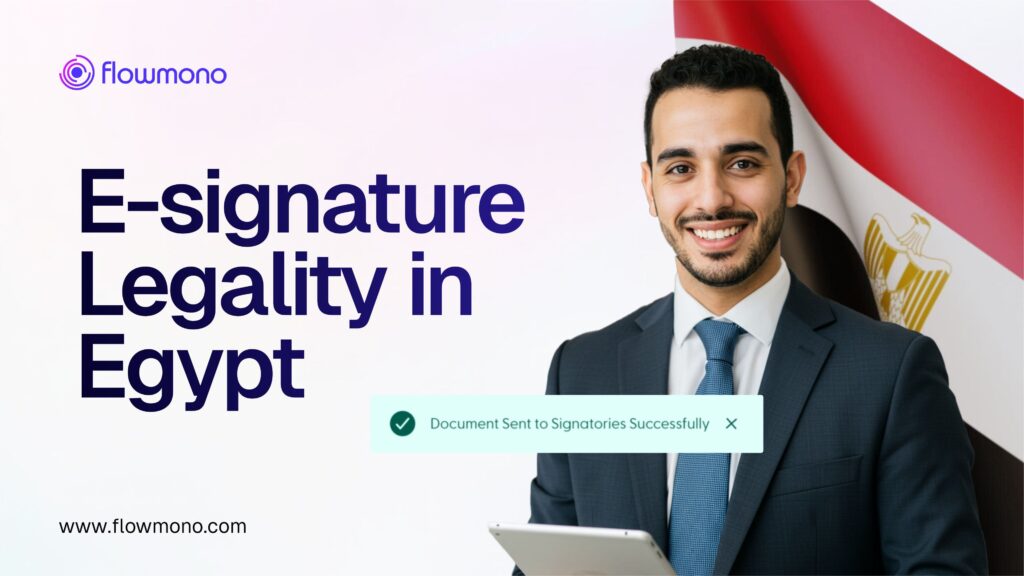
With the digitization of business and legal transactions, electronic signatures (e-signatures) have become a key tool in streamlining processes across sectors. In Egypt, the legal recognition and regulation of electronic signatures are primarily governed by the Electronic Signature Law (ITIDA Law) and its accompanying Executive Regulations (2020). These laws provide a clear legal structure for the use of e-signatures, ensuring their validity, enforceability, and reliability when used correctly.
The Legality of E-signature in Egypt
An electronic signature is a set of data elements—such as letters, numbers, symbols, or other characters—used by a person to sign a digital document. These elements are intended to uniquely identify the signer and distinguish their approval or intent from others. Egyptian law, particularly Articles 89 and 90 of the Civil Code and Article 69 of the Commercial Code, makes it clear that a written signature is not mandatory for a contract to be legally binding. Agreements reached orally, electronically, or in writing are equally valid, provided all other legal requirements are met.
Under Article 14 of the E-Signature Law, a contract cannot be considered unenforceable solely because it was concluded electronically—so long as it adheres to the law’s technical requirements. Certified electronic signatures from recognized authorities, such as Egypt’s Information Technology Industry Development Authority (ITIDA), are automatically treated as admissible evidence in court.
Recognized Form of E-Signature in Egypt
Egyptian e-signature laws officially recognize only one category: the Electronic Signature. Unlike jurisdictions that differentiate between “simple,” “advanced,” and “qualified” e-signatures, Egypt treats the term as a singular, legally defined concept.
Requirements for Legal Admissibility
To be considered legally binding and valid under Egyptian law, an electronic signature must meet the following criteria:
- It must be exclusively connected to the person signing.
- The signer must have sole control over the signature tool or system during the signing process.
- Any changes made to the signature or the document after signing must be detectable.
These standards ensure both the authenticity and the integrity of the document and the signature.
Criteria Linking the Signature to the Signer
For an electronic signature to be uniquely attributable to a signer, it must:
- Be created using a secure signature creation system that complies with Articles 2, 3, and 5 of the Executive Regulations, or
- Be associated with a valid digital certificate issued by a licensed certification authority, or
- Be verifiable in accordance with Article 8 of the Regulations.
Meeting the first criterion is mandatory, along with at least one of the latter two, to ensure uniqueness and integrity.
Documents Suitable for E-Signatures
Electronic signatures can be legally used for a wide variety of documents and purposes in Egypt, including:
- Employment contracts, HR paperwork, and onboarding materials
- Commercial agreements (e.g., NDAs, procurement, and sales contracts)
- Consumer contracts, such as new retail account forms
- Real estate agreements like leases or purchase agreements
- Non-exclusive intellectual property licenses
- Incorporation and corporate governance documents
Exceptions and Restrictions
While many transactions can be executed electronically, some documents still require traditional or more formal processes. These include:
- Contracts for the transfer of real property or deeds, which may still necessitate physical signatures
- Transfers of intangible property
- Documents that require notarization or wet ink signatures, which may not be compatible with e-signature technologies
It is important to consult relevant authorities or legal professionals before using e-signatures in such cases.
Egypt’s Certification System
Egypt’s e-signature framework also includes specific guidelines for certification bodies and the recognition of foreign certification entities:
- Certification authorities are licensed organizations authorized to issue digital certificates that link a signer to their electronic signature.
- A digital certificate serves as proof that a specific person is tied to a signature creation device or system.
- Foreign certification bodies may be recognized by ITIDA if:
- They meet all legal requirements set by Egyptian law
- They have an authorized agent in Egypt
- There is an international agreement supporting mutual recognition
- They are accredited in their home country by a relevant authority
Disclaimer
The information on this site is for general information purposes only and is not intended to serve as legal advice. Laws governing the subject matter may change quickly, so Flowmono cannot guarantee that all the information on this site is current or correct. Should you have specific legal questions about any of the information on this site, you should consult with a legal practitioner in your area.
Resources
- Executive Regulations, 2020
- The Electronic Identification and Trust Services for Electronic Transactions (Amendment etc.) (EU Exit) Regulations 2019
![]()